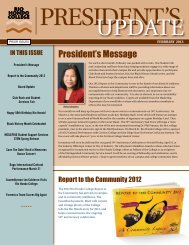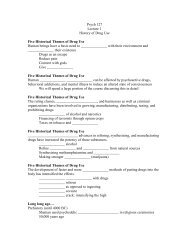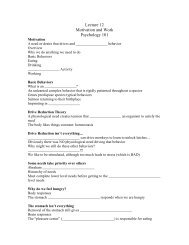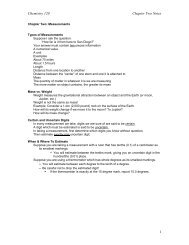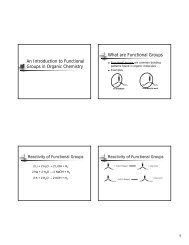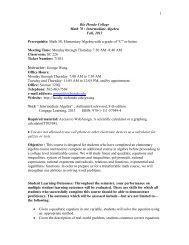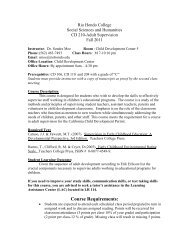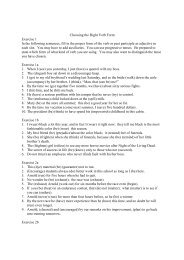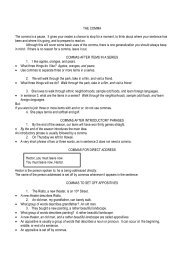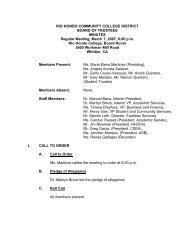Complete College Catalog 2011-2012 - Rio Hondo College
Complete College Catalog 2011-2012 - Rio Hondo College
Complete College Catalog 2011-2012 - Rio Hondo College
Create successful ePaper yourself
Turn your PDF publications into a flip-book with our unique Google optimized e-Paper software.
AJ 104<br />
Legal Aspects of Evidence<br />
Advisory: ENGL 035 or ESL 198 or<br />
appropriate assessment; READ 023 or<br />
appropriate assessment; AJ 101<br />
Transfers to: CSU<br />
This course is designed to provide<br />
Administration of Justice or other<br />
interested students with an in-depth<br />
study of evidence rules. An emphasis<br />
will be placed on the application of<br />
rules in preparing and presenting<br />
evidence. The course will discuss the<br />
history and approach to the study<br />
of evidence. Topics include proof<br />
by evidence and substitutes, general<br />
admissibility tests, evidence by way<br />
of witness testimony, documents, real<br />
evidence, and exclusion of evidence<br />
on constitutional grounds. For a<br />
better understanding of the evidence<br />
rules, judicial decisions are cited and<br />
students will be required to brief cases.<br />
3 Units<br />
54 Lecture hours<br />
AJ 105<br />
Community Relations/Multicultural<br />
Issues Within Public Service<br />
Advisory: ENGL 035 or ESL 198 or<br />
appropriate assessment; READ 023 or<br />
appropriate assessment; AJ 101<br />
Transfers to: UC, CSU<br />
This course is designed to provide<br />
Administration of Justice or other<br />
interested students with an in-depth<br />
understanding of the relationship<br />
between community welfare and law<br />
enforcement. An emphasis will be<br />
placed on the role of modern police in<br />
a metropolitan community.<br />
3 Units<br />
54 Lecture hours<br />
AJ 106<br />
Criminal Law I<br />
Prerequisite: AJ 101 with a grade of “C”<br />
or better, or completion of PAC 040 or<br />
equivalent<br />
Advisory: ENGL 035 or ESL 198 or<br />
appropriate assessment; READ 023 or<br />
appropriate assessment<br />
Transfers to: UC (credit limit*), CSU<br />
(*Students will receive credit from UC<br />
for only one of the following courses: AJ<br />
106 or AJ 107)<br />
This course is designed to provide<br />
Administration of Justice or other<br />
interested students with an in-depth<br />
study of the legal processes from prearrest<br />
through trial. Topics include<br />
sentencing procedures, a review of<br />
the history of case and common law,<br />
and conceptual interpretations of law<br />
as reflected in court decisions. An<br />
emphasis will be placed on cased law<br />
methodology and case research as the<br />
decisions impact upon the procedures<br />
of the justice system.<br />
3 Units<br />
54 Lecture hours<br />
AJ 107<br />
Criminal Law II<br />
Prerequisite: AJ 101 with a grade of “C”<br />
or better, or completion of PAC 040 or<br />
equivalent<br />
Advisory: ENGL 035 or ESL 198 or<br />
appropriate assessment; READ 023 or<br />
appropriate assessment<br />
Transfers to: UC (credit limit*), CSU<br />
(*Students will receive credit from UC<br />
for only one of the following courses: AJ<br />
106 or AJ 107)<br />
This course is designed to provide<br />
Administration of Justice or<br />
other interested students with a<br />
comprehensive discourse on criminal<br />
statutes and their definition. Topics<br />
include classification as applied to the<br />
system of administration of justice,<br />
crimes against persons, property,<br />
general statutes, and health and safety<br />
statutes as well as other state and<br />
federal laws.<br />
3 Units<br />
54 Lecture hours<br />
AJ 200<br />
Introduction to Forensic Chemistry<br />
Prerequisite: Grade of “C” or better in<br />
each of the following courses: BIOL<br />
101; CHEM 231; PHYS 160; MATH<br />
130<br />
Advisory: ENGL 101<br />
Transfers to: CSU<br />
This course is designed to provide<br />
the student who has an interest in<br />
forensic science with an overview<br />
of the role of forensic science and<br />
the crime laboratory analyst in the<br />
legal system. The focus is on nonbiological<br />
evidence, such as controlled<br />
substances and toxicology, trace<br />
evidence, and firearm evidence.<br />
Students will develop the skills<br />
necessary to evaluate the applicability<br />
of each method as it applies to<br />
particular case situations. Issues of<br />
scientific versus legal burdens of proof,<br />
legal terminology, and trial procedure<br />
will also be discussed.<br />
3 Units<br />
54 Lecture hours<br />
AJ 201<br />
Introduction to Forensic Biology<br />
Prerequisite: AJ 200<br />
Advisory: ENGL 101<br />
Transfers to: CSU<br />
This course is designed to provide<br />
students with an introduction and<br />
broad overview of the forensics<br />
sciences. The emphasis will be on<br />
the application of biological sciences<br />
to legal investigations. It will<br />
provide an understanding of various<br />
physiological fluid and DNA testing<br />
methodologies and their applicability<br />
to forensic science. Students will learn<br />
the skills necessary to evaluate the<br />
relevance of each method to particular<br />
case situations. Issues of scientific<br />
versus legal burden of proof, legal<br />
terminology, and trial will also be<br />
discussed.<br />
3 Units<br />
54 Lecture hours<br />
AJ 207<br />
Juvenile Law and Procedure<br />
Advisory: ENGL 035 or ESL 198 or<br />
appropriate assessment; READ 023 or<br />
appropriate assessment; AJ 101<br />
Transfers to: CSU<br />
This course is designed to provide<br />
Administration of Justice or other<br />
interested students with techniques<br />
for handling juvenile offenders and<br />
victims. An emphasis will be placed<br />
on the prevention and repression of<br />
delinquency, diagnosis and referral of<br />
juvenile offenders, and organization<br />
of community resources. Juvenile law<br />
and juvenile court procedures will be<br />
contrasted with adult law procedures.<br />
3 Units<br />
54 Lecture hours<br />
AJ 208<br />
Principles of Investigation<br />
Advisory: ENGL 035 or ESL 198 or<br />
appropriate assessment; READ 023 or<br />
appropriate assessment; AJ 101<br />
Transfers to: CSU<br />
This course is designed to provide<br />
Administration of Justice or other<br />
interested students with an in-depth<br />
study of the basic principles for all<br />
types of investigation utilized in the<br />
justice system. Topics include human<br />
aspects in dealing with the public,<br />
interviews, evidence, surveillance,<br />
follow-up, technical resources, and<br />
case preparation. An emphasis will<br />
be placed on specific knowledge<br />
necessary for handling crime scenes.<br />
3 Units<br />
54 Lecture hours<br />
AJ 215<br />
Vice and Narcotics Control<br />
Advisory: ENGL 035 or ESL 198 or<br />
appropriate assessment; READ 023 or<br />
appropriate assessment; AJ 101<br />
Transfers to: CSU<br />
This course is designed to provide<br />
Administration of Justice or other<br />
interested students with an in-depth<br />
understanding of code and case law<br />
of vice and narcotics. The course<br />
will focus on detection, suppression,<br />
apprehension, and prosecution of<br />
violators. Special emphasis will be<br />
placed on laws dealing with gambling,<br />
prostitution, sex crimes, narcotic<br />
identification, and search and seizure.<br />
3 Units<br />
54 Lecture hours<br />
AJ 228<br />
Police Field Operations<br />
Advisory: ENGL 035 or ESL 198 or<br />
appropriate assessment; READ 023 or<br />
appropriate assessment; AJ 101<br />
Transfers to: CSU<br />
This course is designed to provide<br />
Administration of Justice or other<br />
interested students with an in-depth<br />
understanding of the history<br />
and development of Police Field<br />
Operations. Particular emphasis<br />
is placed on the planning of field<br />
activities. Topics include the functions<br />
of patrol, traffic and other preliminary<br />
investigative duties of the field officer.<br />
<strong>2011</strong>-<strong>2012</strong> <strong>Catalog</strong> <strong>Rio</strong> <strong>Hondo</strong> <strong>College</strong> / 131



